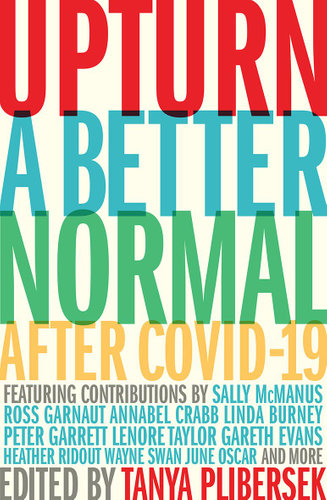Is there a 'better normal' waiting on the other side of Covid-19?
Rosie Clare Shorter discovers the many paths to pursuing justice and compassion
Rosie Clare Shorter recommends Upturn: A better normal after Covid-19, edited by Tanya Plibersek, as an Eternity Summer Read.
I picked up a paperback copy of Upturn: A better normal after Covid-19 from my local bookstore in November. At that time, restrictions were easing across Sydney, there was no Northern Beaches cluster, and I was both ready and curious to consider what might come after Covid-19.
 Edited by Tanya Plibersek and containing thirty short essays and reflections by a host of contributors with experience and expertise across diverse fields – superannuation, banking, politics, medicine, climate science, farming – Upturn shows the ways Covid-19 can be an agent for social and economic disruption, as well as social change and justice.
Edited by Tanya Plibersek and containing thirty short essays and reflections by a host of contributors with experience and expertise across diverse fields – superannuation, banking, politics, medicine, climate science, farming – Upturn shows the ways Covid-19 can be an agent for social and economic disruption, as well as social change and justice.
Despite being an edited collection, the constant narrative throughout is that while Covid-19 has shown us the fault lines in society, it also shows the possibilities of how we can mend and grow together. We see that Covid-19 has ‘amplified’ gender gaps in the work place (Rae Cooper & Sarah Mosseri, p. 98), ‘ripped open’ society, ‘ravaged the whole idea of small government, and highlighted the importance of social and economic justice’ (Cate Blanchett and Kim Williams, p.107), and ‘shone a spotlight on the problems we already had’ (Jim Chalmers, p. 236).
Upturn is a hopeful book. Yes, it showcases leaders and thinkers from the left-er side of the political arena and at times felt like a love song to past Labor prime-ministers, but it avoids cheap digs at those we might consider the political opponents of the collected authors.
As the various contributors spell out their vision for a ‘better normal’, what emerges is a reminder that economic crises are simultaneously human and social crises, that snap-back responses have long-term effects, and that economic recovery is not just an expense but an investment.
This book is a call for stronger collectives and robust communities; Australia’s Aboriginal and Torres Strait Islander Social Justice commissioner, Bunuba woman June Oscar (p. 18) asks us to consider ‘First Nations societies and culture as foundational to Australian Identity,’ Jenny Macklin reminds us of the importance of working across political divides, and Tanya Plibersek argues that education benefits the community not just the individual.
I particularly enjoyed Professor Paul Torzillo’s piece, ‘Healthcare Lessons from Covid-19’, which clearly demonstrates that Covid-19 is not just a problem for today, but a ‘personal and global’ (p. 130) event which will have far reaching consequences. Torzillo calls for more Australians to be ‘trained in critical thinking,’ and argues that Climate change ‘remains the greatest contemporary threat to population health,’ and that the fast response of governments to covid-19 is a lesson in what is possible.
A great aspect of this book was the inclusion of personal accounts by Lachlan Beel, a 17-year-old apprentice, and Eli Scott, a mechanical engineer. It was refreshing to hear from young people not just from those making policy about them.
Professor Ian Chubb’s reminder that we need more than luck if we are to create a better normal is timely and relevant; I have spent much of this year thinking how lucky I am to be living in a city with low case numbers and great testing facilities, when luck is the result of much hard work and hard fought for ideals (e.g. universal healthcare).
Upturn is a hopeful book. Yes, it showcases leaders and thinkers from the left-er side of the political arena and at times felt like a love song to past Labor prime-ministers, but it avoids cheap digs at those we might consider the political opponents of the collected authors. As Australian Council of Trade Unions secretary Sally McManus (p. 42) says, we need to pursue ‘wide dialogue, even with people who had sought to damage us.’
This book is not a one-size-fits-all solution to pursuing justice and a ‘better normal,’ but it does show that there are many alternate routes to follow as we walk into the new year. If we, as Christians, really are interested in working for a fairer, more equitable, more compassionate society, it would be worth considering the collective wisdom and expertise presented in Upturn.
Upturn: A better normal after Covid-19 is edited by Tanya Plibersek (2020) and published by UNSW Press NewSouth, where it can be purchased for $32.99.
Email This Story
Why not send this to a friend?


